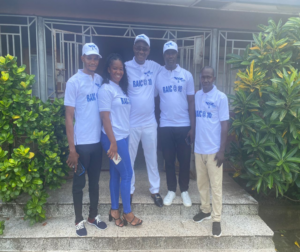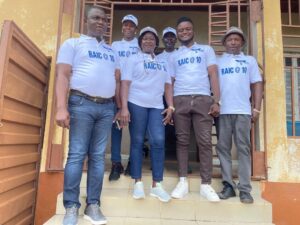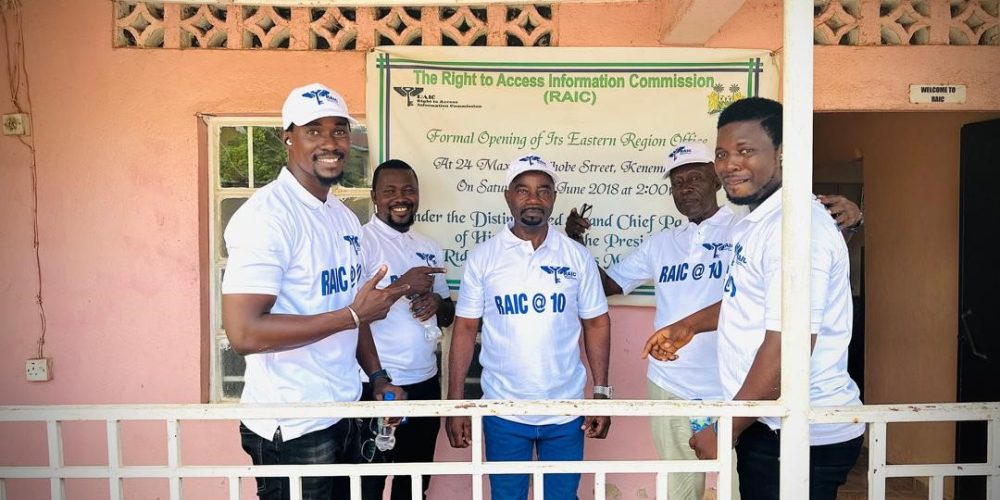The regional offices of the Right to Access Information Commission (RAIC) last week joined the national secretariat in Freetown to commemorate ten years since the Commission’s establishment in 2014, following the enactment of the Right to Access Information (RAI) Act in 2013. A s the RAIC national secretariat kickstarted the 10th anniversary celebrations in Freetown on Tuesday 15th October, 2024, regional offices in Kenema, Makeni, and Bo simultaneously held activities in their respective jurisdictions as part of the national commemoration.
These regional offices engaged stakeholders and hosted media programmes to highlight the Commission’s successes, challenges, and opportunities in promoting access to information across the country, particularly under the leadership of Dr. Ibrahim Seaga Shaw, Chairman and Information Commissioner, alongside his team of commissioners, staff, and volunteers.
In the eastern region office in Kenema, Eastern Region Commissioner Ahmed G. Kallon organized two phone-in radio discussion programs in Kenema and Segbwema to update the public on the Commission’s current activities, share its achievements, and discuss both the challenges faced and the promising future that lies ahead.
Commissioner Ahmed G. Kallon formed two teams of two staff members each for the media engagements. He, along with Administrative Assistant Jonathan Palmer, engaged Top Radio, while Public Information and Communication Officer James Fortune represented the Commission on Voice of The East (VOTE) FM in Kenema.
During his media appearance, Commissioner Kallon echoed the message of the Commission’s Chairman and Information Commissioner, Dr. Ibrahim Seaga Shaw, emphasizing the importance of access to information in promoting transparency, accountability, and good governance.
“This celebration is a moment of reflection for our country—a nation once defined by corruption and an eleven-year civil war—now transforming into a state where access to public information, data, and knowledge is becoming a practical reality,” he stated. The Commissioner further reminded the public that “access to information is not a privilege but a fundamental right that empowers individuals, strengthens communities, and fuels democratic participation.”
Public Information and Communication Officer for the eastern region, James Fortune, reinforced this point, saying, “Access to information is a tool that empowers every citizen, regardless of status or class, to actively participate in democratic processes.”
Listeners who participated in the phone-in programs urged the government to address the Commission’s critical challenges, noting that its mandate is crucial in the fight against corruption and the advancement of good governance.
Commissioner Kallon also took the opportunity to engage regional staff, highlighting the significance of the day and the Commission’s work.
The northern region office was equally in a celebratory mood, marking the Commission’s tenth anniversary by engaging with the media and key individuals and institutions involved in advancing access to information.
Addressing stakeholders, Northern Region Commissioner Abu Bakarr Kargbo highlighted that the Right to Access Information (RAI) Law, enacted in 2013, was a recommendation from the Truth and Reconciliation Commission (TRC) Report to promote transparency, accountability, and good governance in Sierra Leone. This led to the establishment of the Commission in 2014 to fully implement the RAI Act.
Commissioner Kargbo recalled that the TRC identified the lack of government accountability as a root cause of Sierra Leone’s civil war, prompting the recommendation. He stressed that without access to public information, fundamental freedoms such as expression and association lose their meaning.
In his keynote address, Commissioner Kargbo underscored that public authorities are obligated to provide information upon request, except in cases where the information is exempt under the RAI Law.
Highlighting the Commission’s achievements over the years, he noted that the Commission has organized and facilitated numerous capacity-building activities for its staff, the media, civil society, and public authorities on access to information and related issues. He further stated that the Commission now operates a functional website, a development introduced under the current administration, which took over in 2018.
Before 2018, the Commission lacked an audit system, but the current leadership has addressed this gap, and the Commission now produces professional audit reports. He also emphasized the Commission’s success rate in processing Freedom of Information (FOI) requests, with 90% of requests being fulfilled.
“We have embarked on extensive media engagements and public sensitization, which has led to significant improvements in compliance by public officials when citizens make requests,” he said.
Commissioner Kargbo also highlighted that the Commission achieved a 98% score on Freedom of Information in the 2022 MCC Global Scorecard. He concluded by noting that fines imposed on defaulting institutions should encourage the public to submit more requests, while also urging institutions to process requests promptly.
Foday Conteh, Regent Chief of Bombali Shebora Chiefdom, commended the Northern Region staff for their proactive efforts in popularizing the RAI Act, stating that many residents across the seven districts now have some knowledge of access to information.
Aiah Sorie, Public Education Officer for the Anti-Corruption Commission in the North, praised RAIC for the progress made over the years. Emmanuel Fanday Bayoh, Station Manager of the Sierra Leone Water Company (SALWACO) in Makeni, also lauded the Commission for holding public authorities to account.

The southern region office for its part marked the Commission’s 10th anniversary by bringing together the media, civil society organizations, and MDAs operating in the region. The event served as a platform to highlight the Commission’s achievements, discuss its challenges, and exchange ideas on the way forward.
Commissioner-South, Biah Y. Idriss, gave a background on the Access to Information Act 2013, recognizing the role of various advocacy groups in getting the law passed and the Commission established.
“The Commission was established in 2014 in Freetown and later in all the regions with the mandate of promoting access to information held by or under the control of public authorities which enhances transparency, accountability and good governance,” he said.
Commissioner Idriss told the participants that the Commission has progressed a lot under the leadership of the Chairman and Information Commissioner, Dr Ibrahim Seaga Shaw.
Like earlier mentioned by other regional commissioners, Commissioner Idriss articulated in details the significant gains made by the Commission under its current leadership.

Mr. Alusine Bangura, the Information, Education, and Communications Officer of Bo District Council, praised the work of the RAIC and assured that the council would continue to support the Commission whenever needed. He emphasized the need for greater collaboration with the RAIC’s southern region office to promote the Commission’s mandate, especially in rural areas where media access is limited.
Civil society activist Joseph Blackie recommended that the Commission produce jingles in various Sierra Leonean languages to broaden outreach and raise awareness. Another activist, Mr. Mustapha Kpaka, commended the Commission’s efforts and pledged that civil society in the south would serve as ambassadors, promoting the RAI law and the Commission’s achievements.
In his closing remarks at the 10th anniversary event in the southern region, Commissioner Idriss reiterated that access to information is not a privilege but a right. He urged public authorities to ensure compliance with information requests.
Reported by Regional Public Information Officers
Compiled by PICO – National Secretariat
For media enquiries, contact:
Amara Thoronka
Public Information & Communication Officer
RAIC – National Secretariat
+232 88 283632 / +232 78 231949





